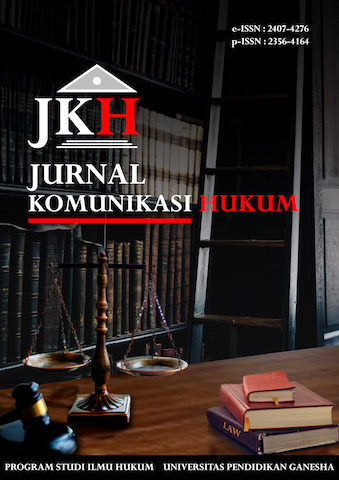TINDAKAN NOTARIS-PPAT DALAM MENANGANI PERJANJIAN PERALIHAN HAK ATAS TANAH YANG BERPOTENSI KONFLIK
DOI:
https://doi.org/10.23887/jkh.v8i2.51394Abstract
The making of a deed of sale and purchase of land by a Notary / Land Deed Making Officer (PPAT) is not in accordance with the procedures for making a Land Deed Deed (PPAT). This is caused by the existence of situations and conditions in the sale and purchase which causes the discrepancy seems to be done so that the transaction or process of buying and selling land can take place. In accordance with the above bachground, the authors are interested in conducting further research with the little Notary-PPAT Action in Handling Land Rights Transfer Agreements that Have The Potential to Conflict : 1. The formulation of the problem is what are the factors that cause an agreement to transfer land rights to potential conflict. 2. What are the forms of action of a notary-PPAT in dealing with land rights transfer agreements that have the potential for conflict. This type of research is empirical legal research, namely research based on facts in the field and collected by processing certain data. The problem approach used is empirical-juridical, namely by examining the reality in the form of the case of the transfer of land rights agreement and then linking it with juridical facts which then tries to find solutions to the gaps. The conclusion of this study is the factors causing the occurrence of potentially conflicting agreements include: 1) There is a situation that requires the Land Deed Maker Official (PPAT) to make a deed of sale and purchase that is not in accordance with the procedures for making a PPAT deed, which is needed in order to save a sale and purchase transaction; 2) There is a very high mutual trust between fellow Land Deed Making Officials (PPAT) and between the parties and the PPAT; 3) The time and busyness factor of the parties; 4) Reasons for time efficiency for the parties due to the making of the deed of sale and purchase; 5) The factor of the value of the sale and purchase transaction; 6) Relationship and friendship factors; 7) Factors caused by a request from the parties. The forms of action of the Notary-PPAT in dealing with land rights transfer agreements that have the potential to conflict are a process in the context of motivational orientation and value orientation. On the principle of motivational orientation which refers to individual desires (Notary-PPAT) which acts to increase satisfaction and reduce losses, four basic considerations are found as follows: 1) Basic considerations of success; 2) Value considerations; 3) The basis for consideration of experience; 4) Rare opportunity considerations.
Downloads
Published
How to Cite
Issue
Section
License
Authors who publish with this journal agree to the following terms:- Authors retain copyright and grant the journal right of first publication with the work simultaneously licensed under a Creative Commons Attribution License that allows others to share the work with an acknowledgement of the work's authorship and initial publication in this journal.
- Authors are able to enter into separate, additional contractual arrangements for the non-exclusive distribution of the journal's published version of the work (e.g., post it to an institutional repository or publish it in a book), with an acknowledgement of its initial publication in this journal.
- Authors are permitted and encouraged to post their work online (e.g., in institutional repositories or on their website) prior to and during the submission process, as it can lead to productive exchanges, as well as earlier and greater citation of published work (See The Effect of Open Access).
Authors who publish with this journal agree to the following terms:
- Authors retain copyright and grant the journal right of first publication, with the work [SPECIFY PERIOD OF TIME] after publication simultaneously licensed under aCreative Commons Attribution License that allows others to share the work with an acknowledgement of the work's authorship and initial publication in this journal.
- Authors are able to enter into separate, additional contractual arrangements for the non-exclusive distribution of the journal's published version of the work (e.g., post it to an institutional repository or publish it in a book), with an acknowledgement of its initial publication in this journal.
- Authors are permitted and encouraged to post their work online (e.g., in institutional repositories or on their website) prior to and during the submission process, as it can lead to productive exchanges, as well as earlier and greater citation of published work (See The Effect of Open Access).












